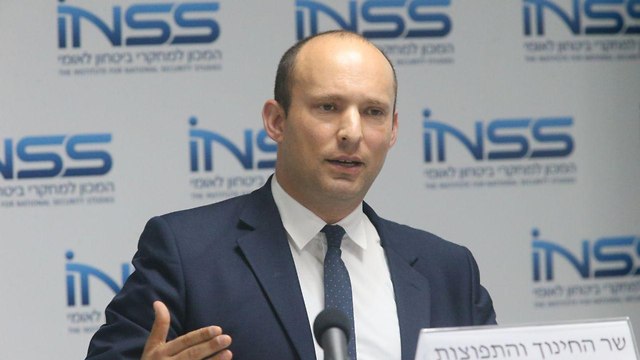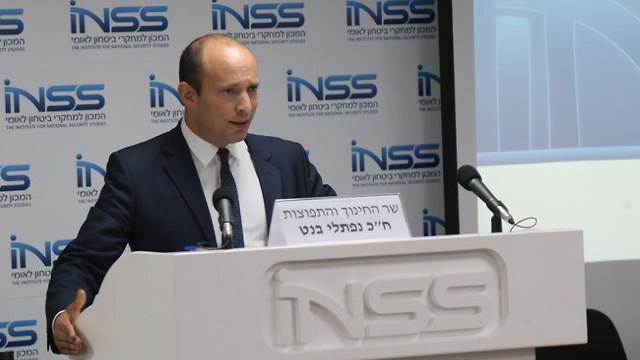
Bennett: We need to fix Israel's security policy
Education minister and member of the Security Cabinet criticizes loss of deterrence following horrific terror attack at the Barkan industrial zone, calling to shoot to kill Palestinians infiltrating Israel from Gaza to plant bombs, put an end to PA's benefits to terrorists and demolish terrorists' homes.
"I think we need to make a very significant and quick change to Israel's security policy and restore the deterrence," Bennett said at the Institute for National Security Studies (INSS).
The minister said there was much to fix in Israel's security policy, "from tactical aspects to strategic ones, but on the most basic level—in recent months, there have been daily infiltrations through the Gaza border ... dozens of terrorists come out every day, including today, plant explosives, and go back home safely."
"I've been asked what I'd do differently. I'd give the order to kill them. We need to kill terrorists who infiltrate Israel," he stressed.
Bennett also insisted Israel must stop the Palestinian Authority's benefits to terrorists. "Starting November 1, the family of the terrorist (from the Barkan attack) will get some NIS 15,000 a month. We need to stop this. I've been explained that it's legally complicated, there are plenty of explanations. We need to stop it. We need to demolish the terrorist's house. Not take measurements, but demolish," he said.
He complained that homes of other Israelis murdered in terror attacks—Ari Fuld, Ronen Lubarsky, Yanai Weissman, Asher Hasano—have not been demolished yet. "102 homes of murderers of Israelis, which had their measurements taken, are still standing. We need to demolish the homes, go from talking about deterrence to creating deterrence. I plan to act to restore deterrence with clear actions," Bennett vowed.
The INSS has presented its own proposal for a diplomatic-security plan for the Israel-Palestinian conflict. According to the INSS, since there will be no solution to the conflict in the foreseeable future, moves are required to prepare and promote a future solution. Those proposed moves include bolstering Israel's security alongside reducing the friction with the Palestinian population.
The INSS argues that the more the Palestinian security services do, the less the IDF would have to do. The proposed INSS plan also includes anchoring Israel's interests in the West Bank ahead of a future agreement in addition to improving the state's strategic situation, inter alia, by strengthening international legitimacy through security, diplomatic, and economic cooperation.
"At the end of the day, this is the same Palestinian state in a different guise," Bennett said, rejecting the INSS plan. "At the end of the day, it's about freezing construction outside the (settlement) blocs and transferring more and more control and governability in Area C to the Palestinians. I can't see the big achievement here."
He pointed out that "the plan doesn't require the consent of the Palestinians, and other than freeze construction, which is their biggest dream, we won't do anything. We have no idea how to evacuate tens of thousands of Israelis, so we won't evacuate communities, we'll just suffocate them... this means Eli, Beit El, Ofra, Kiryat Arba will wither and die."
Bennett argued that "we're showing that you can strengthen (Israel's) international status even without giving up land. This giving doesn't necessarily bring any kind of respect. I also don't think anyone would accept it. Even when (Ehud) Barak or (Ehud) Olmert wanted to give 97 percent of the land (to the Palestinians), it wasn't acceptable. So this plan will certainly not be acceptable."
 |


















